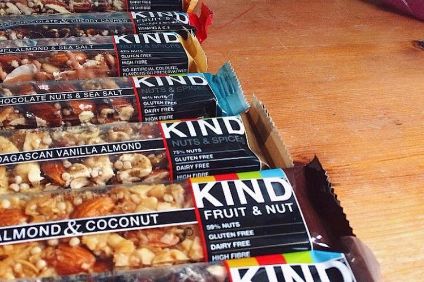
Kind, the US snacks group, has refused to be drawn on a report that claimed it has hired banks to advise it on the sale of a minority stake in the business.
Reuters said today (7 July) Kind had appointed investment banks BDT Capital Partners and Centerview Partners Holdings to work on selling a shareholding in the company. BDT holds a minority stake in Kind, which was set up in 2004.

Discover B2B Marketing That Performs
Combine business intelligence and editorial excellence to reach engaged professionals across 36 leading media platforms.
Kind is not offering interested parties the option to buy full control of the business at a later date, Reuters added.
Approached by just-food for comment, a spokesperson for Kind said: “Kind is solely focused on becoming the foremost health and wellness leader. Kind is regularly approached by prospective partners and only evaluates them if it can help advance our mission to grow Kind but we never comment on rumors about those conversations.”
Founder and CEO Daniel Lubetzky, who set up Kind in 2004, accepted investment from private-equity firm VMG Partners in 2008 in return for shares in the business. In 2014, Lubetzky bought back the shares. He remains the largest shareholder in Kind but each of the company’s full-time employees are also investors in the business.
The growth of Kind has led industry watchers to point to the business as an example of a brand that has had success in eating into the sales of established incumbents.

US Tariffs are shifting - will you react or anticipate?
Don’t let policy changes catch you off guard. Stay proactive with real-time data and expert analysis.
By GlobalDataIn a report issued in May 2016 entitled Has US Food Lost that Growing Feeling? – Why Volumes Could Worsen, investment bank Sanford Bernstein wrote: “Structural top-line challenges that have been reshaping the US food group in recent years are unlikely to let up – and if anything, could intensify and further separate the winners from the losers. Difficulties started with the rise of the Internet and social media, which prompted a major online conversation about what’s in my food, causing mums of young children to shift away from heavily processed foods into fresher alternatives.
“Consequently, Big Food brands have been left in the dust. On the rise are challenger brands with simpler ingredients that are successful in building online support using digital media for advertising. Early examples include Chobani Greek yogurt and Kind snack bars — with their meteoric rise being the very definition of declining barriers to entry. These new brands are eating away at the incumbent products to the point that the Big Food companies are now acquiring these challenger brands as a way to promote growth, and to some extent, replace their innovation efforts on legacy brands, where returns on investment are falling.”
Interview from spring 2016: How Kind aims to continue growth – CEO Daniel Lubetzky on the company’s US, international plans





